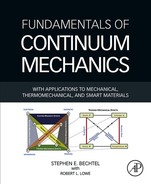A Family of Thermomechanical Processes
In this appendix, we present a particular family of motions and temperatures, given by the following functions of space and time:
where t0, Θ0, and a are arbitrary constant scalars, X0, g0, and a are arbitrary constant vectors, and F0 and A are arbitrary constant tensors. Loosely speaking, (D.1) gives a family of motions and temperatures with an infinite number of members. From (D.1), with the aid of results (2.99) and (3.22), we can explicitly calculate
At the particular place X = X0 and time t = t0, the above functions take the values
and
It follows that
at place x = X = X0 and time t = t0.
Recall that t0, Θ0, a, X0, g0, a, F0, and A are arbitrary quantities. We have therefore explicitly exhibited a family of thermomechanical processes (D.1) in which the temperature Θ, deformation gradient F, rate of deformation gradient ![]() (or, alternatively, velocity gradient L or rate of deformation D), temperature gradient g, rate of temperature gradient
(or, alternatively, velocity gradient L or rate of deformation D), temperature gradient g, rate of temperature gradient ![]() , and rate of temperature
, and rate of temperature ![]() can be chosen independently at any place and time.
can be chosen independently at any place and time.




